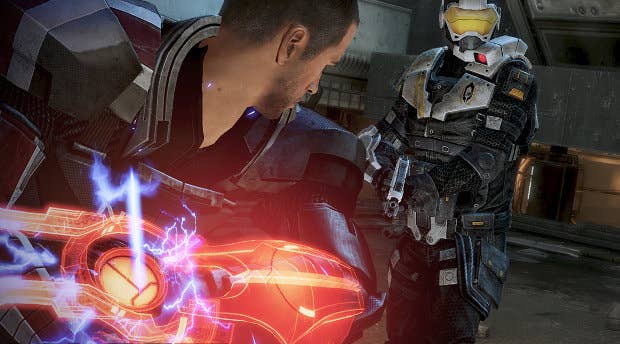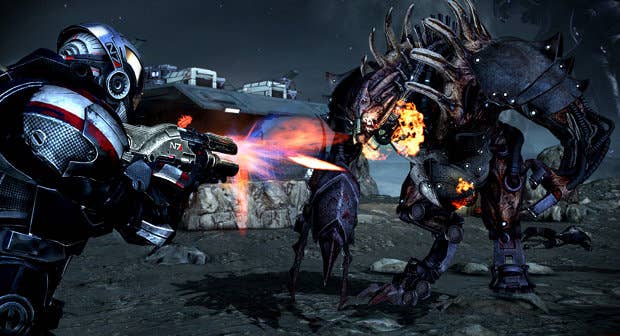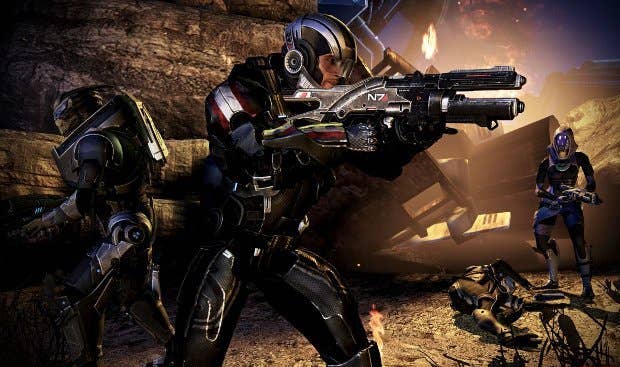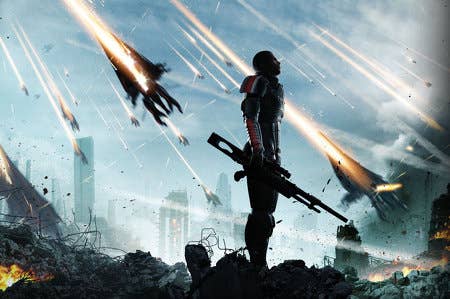Critical Consensus: Mass Effect 3
Commander Shepard's epic five-year battle draws to a close, but has BioWare silenced its critics?
Where do you start with a game like Mass Effect 3? The final act of an epic story that has taken note of dozens of narrative choices, both big and small, across three substantial games. Where every player has their own version of its force-of-nature protagonist, Commander Shepard, and expects the conclusion to the story to feel satisfying on both micro and macro levels - from individual relationships, to the fate of the entire galaxy.
According to virtually every existing review the only place to start is 2007, with the first Mass Effect. Time may not have been kind to BioWare's ambitious entrance into that world, and its streamlined sequel may have been criticised for dumbing-down, but no matter how many game modes EA adds to welcome in new players for the close of the trilogy, the glory of Mass Effect 3 at its best cannot be grasped by a first-timer.
You can tell Eurogamer's Dan Whitehead had a rewarding experience, and not just because of the 10 sitting at the bottom of the text. Tellingly, Whitehead deploys a first-person anecdote to book-end his glowing review - a tactic often used by critics who like a game so much that a breakdown of its mechanics, story and atmosphere just aren't enough to convey their excitement.
In the context of Mass Effect 3, however, it can be read as a confirmation that BioWare has delivered on one of the loftiest creative promises of this console generation.

"As the tale unfolds, it becomes clear that BioWare has played for the long term, as decisions you made in 2007 - both major and minor - are not only referenced but seamlessly woven into the ongoing drama. Rather than allowing the big choices to send the story off down wildly diverging tangents, they instead colour the context and history of your adventure."
"There were characters in my game that have been five years dead for other players. Seemingly minor moments from DLC adventures that others won't have seen come back to haunt me."
For anyone who enjoyed Mass Effect 3's predecessors, Whitehead's words will be incentive enough to buy the game. Indeed, for most it will be the main reason they have played the series at all, but BioWare has invested considerable time and effort to provide further ways of personalising the experience.
There were characters in my game that have been five years dead for other players. Seemingly minor moments from DLC adventures come back to haunt me
Dan Whitehead, Eurogamer
"The game is flexible in many other ways as well, offering different variations of difficulty and gameplay emphasis depending on your preference. Whether you want a thoughtful character-driven adventure, a balls-out third-person shooter or the full role-playing epic experience, there's a setting that accommodates you. And that's before you get into the different character classes, the reputation system and the different squad combinations that can all nudge the experience in a myriad of ways."
"That the game doesn't pull itself to pieces by trying to move in so many directions at once is down to the solid core inherited from Mass Effect 2. In terms of evolution, this is a refinement rather than the radical reinvention that followed the ambitious but clunky first game."
The Escapist's Susan Arendt is slightly less kind about the "solid core" inherited from Mass Effect 3's predecessor. In her 9 out of 10 review, Arendt brims with admiration for the game's skilfully personalised fiction, but her praise for the "frustratingly difficult" combat gameplay is less effusive.
"Mass Effect 3's combat kicks things up a notch or twelve...a change that's not always entirely welcome. The new enemies are daunting (and at times terrifying), but while you could get through Mass Effect 2 with minimal attention to cross-disciplinary styles, Mass Effect 3 seems to really, really want you to coordinate your attacks with your squad-mates."
Arendt suggests that this could be down to the introduction of Kinect voice-commands, a feature that has been generally well received by critics - Arendt included. However, the emphasis on collaborative combat is undermined by "shockingly stupid" partner AI and an "equally hit-and-miss" cover mechanic.

Few other reviews share in this harsh appraisal of Mass Effect 3's combat, with most commending a sharper and more refined feel than in either of its predecessors. However, there is one area of the gameplay that every critic agrees on: the death of Mass Effect 2's planet-mining, and the introduction of an altogether more engaging distraction.
"Upon entering a system, you'll scan the area to see if you can find anything valuable, but instead of having to scan the entire planet, you can just zero in on the hotspot. Some material just floats around in space, so it may take you several scans to find everything in a particular system, but each scan helps Reapers target your location."
"Spend too much time looking, and you'll have to outrun enemy ships. The resources you collect aren't just rocks and minerals this time around, either, and you can immediately see the effect that finding them has on your campaign. You won't feel obligated to track them all down - you'll feel motivated to."
The story of Mass Effect 3 feels like one big coincidence after another. because you're constantly and conveniently bumping into prominent cast members
Jeff Gerstmann, Giant Bomb
Mass Effect 3's narrative is composed of Shepard's various attempts to drum up support for the fight against the Reapers. The player's performance informs the way the story ends - who lives and who dies, from treasured individuals to entire races. However, if the "Effective Military Strength" bar needs a top-up, players can do so through Mass Effect 3's co-operative multiplayer mode. But for Giant Bomb's Jeff Gerstmann the incentive is somewhat redundant, given how simple it is to fill the bar in the first place.
Indeed, with a score of 4 out of 5, Gerstmann's review is one of the more damning, yet he has few substantial criticisms of any part of the game, and seems quietly impressed by then Horde-esque co-operative multiplayer component. BioWare introduces time-based objectives to the usual waves of enemies, and awards credits and experience points for successful play, which can be exchanged for items and ability upgrades respectively.
"Even though it has some interesting ideas, it's hard to get excited about yet another take on wave-based survival, especially one that uses the occasionally-clumsy Mass Effect combat as its base," Gerstmann adds. "Once you start thinking about how most of the campaign's side content either uses these same multiplayer levels or has you performing extremely basic retrieval tasks, it's easy to start feeling slightly indignant about the whole thing."
And yet like other critics who saw fit to award the game a higher score, Gerstmann is unequivocal about the real reason to play Mass Effect 3: watching dozens of familiar characters closing out a story five years and 100+ hours of gameplay in the telling.
"Mass Effect 3 can feel like a reunion... It's easy to see where the existing characters can either plug right into the action or be replaced with generic counterparts, if necessary. Heading out to meet up with Krogans? Hey, Grunt's there! Encountering the Quarians? You'd better believe that Tali's showing up. And yes, you'll face the Geth, and... yeah, it's not hard to guess about who you'll run into along the way."

"In a game where the full crew of ME2 survived, the story of Mass Effect 3 feels like one big coincidence after another because you're constantly and conveniently bumping into prominent cast members. Yet most of these old crew mates won't be returning to the Normandy this time around, because most of them have other responsibilities... They'll be heading up a second squad or off performing their own tasks while you fight, relegating them to little more than radio chatter."
For someone who has played with a single character from the beginning these brief encounters add colour and texture to the story. However, if you're one of the many new players EA hopes to attract with the series' first day-one multi-platform release, Gerstmann is less certain about how the experience will translate.
"At the end of the day, Mass Effect 3 is a game for people who liked Mass Effect 2 so much that they absolutely need to see how it all ends. Despite claims to the contrary from the game's publisher, I really don't think newcomers will get much out of it at all."
"The value in this story is from seeing characters you adore dealing with a continuing situation. Even though it doesn't come together quite as successfully as it did in the previous games, those of you with an attachment to the Mass Effect universe should still play it."

